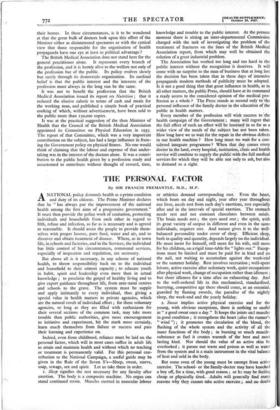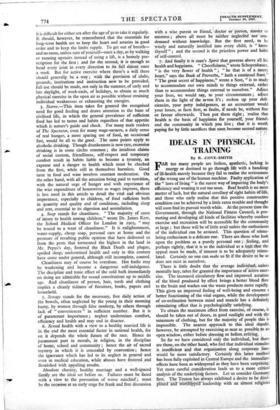THE PERSONAL. FACTOR
By SIR FRANCIS FREMANTLE, M.D., M.P.
ANATIONAL policy demands health as a prime condition and duty of its citizens. The Prime Minister declares that he " has always put the improvement of the national health among the first aims of a progressive government." It must then provide the police work of sanitation, protecting individuals and households from each- other in regard to filth, refuse and infection, so far as is necessary and is agreed as reasonable. It should assist the people to provide them- selves with proper houses, pure food, water and air, and to discover and obtain treatment of disease. Where, as in town life, in, schools and factories, and in the Services, the individual has little control of his circumstances, communal services, espeCially of inspection and regulation, are necessary.
But above all is it necessary, in any scheme of national health, to throw responsibility back -on to the individual and household to their utmost capacity ; to educate youth in habit, spirit and leadership even more than in actual knowledge ; to proclaim the gospel of healthy living and to give expert guidance throughout life, from ante-natal centres and schools to the grave. The system must be supple and apply intimately to every individual, thus giving a special value in health matters to private agencies, which are the natural result of individual effort ; for these voluntary agencies, so long as they are filled with enthusiasm for their several sections of the common task, may take more trouble than public authorities, give more encouragement to initiative and experiment, hit the mark more certainly, learn much themselves from failure or success and pass their learning and experience on.
Indeed, even from childhood, reliance must be laid on the personal factor, which will in most cases suffice in adult life to attain and maintain health and without which no teaching or treatment is permanently valid. For this personal con- tribution to the National Campaign, a useful guide may be given in the Rule of the Seven S's—Sleep, sweat, starve, soap, sewage, sex and spirit. Let us take these in order.
1. Sleep signifies the rest necessary for any faculty after exertion. The body is a composite machine. _ No organ can stand continued strain. Muscles exerted in muscular labour or athletics demand corresponding rest' -Even the htiart, which beats on day and night, year after year throughout our lives, needs rest from each day's exertions, rest especially after and in the intervals of special exertion. The stomach needs rest and not constant chocolates between meals. The brain needs rest ; the eyes need rest ; the spirit, with its great variety of output in different and even in the same individuals, requires rest. And nature gives it to the Well- balanced personality 'under cover of sleep. Efficient deep, both in quality and quantity, depends largely on the individual. He must insist for himself, still more for his wife, still more for his children, on a rigid time-table for " lights out." ExCep- tions must be limited and must be paid for in kind and on the nail, not waiting to accumulate against the week4end or the summer holiday. Rest involves recreation ; well-spent leisure, active exercise after sedentary work, quiet occupations after physical work, change of occupation rather than idleness ; but sheer -idleness for a time after an exhausting day. And to the well-ordered life in this mechanised, standardised, hurrying, competitive age there should come, as an essential, guarded by flaming swords, the paradise of the nightly sleep, the week-end and the yearly holiday.
2. Sweat implies active physical exercise and for the young, with obvious exceptions, there is nothing so useful as " a good sweat once a day." It keeps the joints and muscles in good condition ; it strengthens the heart (alias the runner's " wind ") ; it promotes the circulation of the blood, the flushing of the whole system and the activity of all the inner functions of the body ; in burning so much muscle- substance as fuel it creates warmth of the best and most lasting kind. Nor should the value of an active skin be overlooked ; it passes out waste and poison as well as water from the system and is a main instrument in the vital balance of heat and cold in the body.
But some even of the young must be exempt from active exercise. The school- or the familycloctor may have knocked a boy off, for a time, with good reason ; or he may be feeling cheap. or ..physic-ally, tired._ _Adults _will. generally find many reasons why they cannot- take -active exercise ; and-no doubt it is difficult for either sex after the age of 3o to take it regularly. It should, however, be remembered that the essentials for long-term health are to keep the heart and arteries in good order and to keep the limbs supple. To get out of breath— and no more, unless sure of yourself—once a day, as by walking or running upstairs instead of using a lift, is a homely pre- scription for the first ; and for the second, it is enough- to bend every joint in every direction to its full extent once a week. But for active exercise where there's a will there should generally be a way ; with the provision of clubs, grounds, institutions and instruction now to be provided, full use should be made, not only in the summer, of early and late daylight, of week-ends, of holidays, to obtain as much physical exercise in the open air as possible without straining individual weaknesses or exhausting the energies.
3. Starve.—This item takes for granted the recognised need for good feeding and draws attention to the bane of civilised life, in which the general prevalence of sufficient food has led to tastes and habits regardless of that appetite which is nature's guide and check. For many male readers of The Spectator, even for many wage-earners, a daily sense of real hunger, a more sparing use of food, an occasional fast, would be all to the good. The same points apply to alcoholic drinking. Though drunkenness is now rare, excessive drinking is in some circles common ; the insidious claims of social custom, friendliness, self-respect and temporary comfort result in habits liable to become a tyranny, an expense and a danger to health which must be checked from the first, while still in themselves harmless. Good taste in food and wine involves constant moderation. On the other hand, with all the attention being paid to nutrition, with the natural urge of hunger and with experience of the wise expenditure of housewives as wages improve, there is less need in this article to detail the vital and obvious importance, especially to children, of food sufficient both in quantity and quality and of conditions, including sleep and rest, essential to its digestion and assimilation.
4. Soap stands for cleanliness. " The majority of cases of injury to health among children," wrote Dr. James Kerr, the School Medical Officer for London in 1905, " may be traced to a want of cleanliness." It is enlightenment, water-supply, cheap soap, personal care at home and the pressure of resulting public opinion that have delivered us from the pests that tormented the highest in the land in Mr. Pepys's day, fostered the Black Death and plague, spoiled sleep, undermined health and only in this century have come under general, although still incomplete, control.
Cleanliness may of course be overdone. Hot baths may be weakening and become a dangerous self-indulgence. The discipline and tonic effect of the cold bath immediately on rising are admirable for sound constitutions up to middle age. And cleanliness of person, hair, teeth and clothing implies a cleanly tidiness of furniture, books, papers and household.
5. Sewage stands for the necessary, free daily action of the bowels, often neglected by the young in their morning hurry, by women through false modesty, by others through lack of " conveniences " in sufficient number. But it is of paramount importance ; neglect undermines comfort, efficiency and health and may end in disaster.
6. Sexual health with a view to a healthy married life is in the end the most essential factor in national health, for on it depends the whole future of the race. Hence its paramount part in morals, in religion, in the discipline of home, school and community ; hence the air of sacred mystery in which it is concealed by convention ; hence the ignorance which has led to its neglect in general and even in medical education, while abuses have festered and flourished with appalling results. - Absolute chastity, healthy marriage and a well-spaced family are the ideal set before us. Failures must be faced with a view to the prevention of worse mischief ; must be the occasion at an early stage for frank and free discussion with a wise parent or friend, doctor or parson, master or mistress ; above all must be neither neglected nor con- demned without knowledge. But the first need, to be wisely and naturally instilled into every child, is " know thyself " ; and the second is the priceless power and habit of self-control.
7: And finally it is man's Spirit that governs above all his health and happiness. " Cheerfulness," wrote Schopenhauer, " is the very flower of health " ; " he that is of a merry heart," says the Book of Proverbs, ".path a continual feast." " The great secret of happiness," wrote a Scot, " is to study to accommodate our own minds to things external, rather than to accommodate things external to ourselves." Adjust your lives, we would say, to your circumstances ; adjust them in the light of the seven S's ; reckon up your defi- ciencies, your petty indulgences, as an accountant would your losses, as facts first, as faults, if needs be, without fear or favour afterwards. Then put them right ; realise that health is the basis of happiness for yourself, your friends and the community in which you live ; that it is worth paying for by little sacrifices that soon become second nature.



























































 Previous page
Previous page